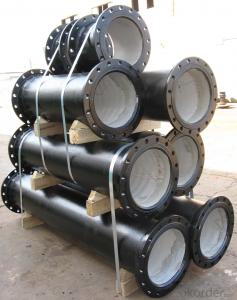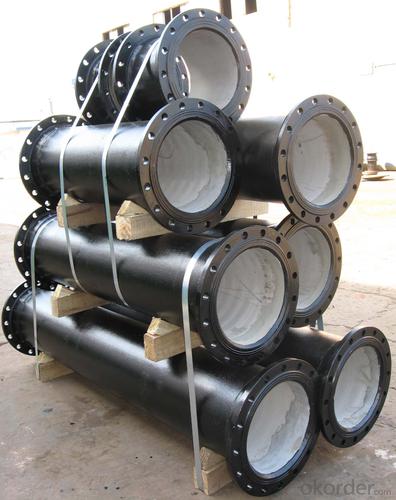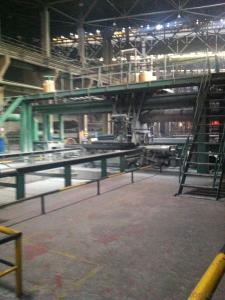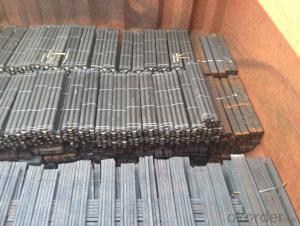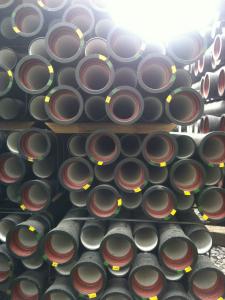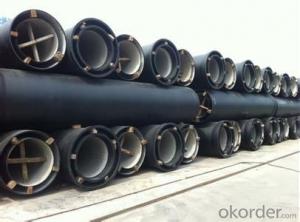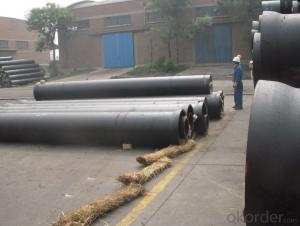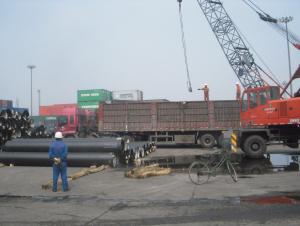DUCTILE IRON PIPES AND PIPE FITTINGS K8 CLASS DN500
- Loading Port:
- Tianjin
- Payment Terms:
- TT OR LC
- Min Order Qty:
- 22 pc
- Supply Capability:
- 3000 pc/month
OKorder Service Pledge
OKorder Financial Service
You Might Also Like
Material : Ductile Cast Iron
Size Range : DN 80mm to DN 2000mm
Unit Effective Length : 6m or 5.7m
Manufacture Standard: ISO 2531:1998/ EN 545:2006/EN 598:2007
Annual capacity : 200,000 tons
Coating Exterior: Zinc 130g/m2 according to ISO 8179-1 and bitumen coating 70 microns.
Cement Interior: Portland Cement/ High Alumina Cement/ Sulphate Resisting Cement Lining according to ISO 4179
Special requirements on external coating and internal lining can be applied
We also provide accessories such as SBR/EPDM rubber gaskets, lubricant paste, pipe caps, PE sleeves, etc.
Additional Parts:
Each pipe is strictly inspected according to related standard to ensure permanently high performance.
Easy Installation at site and service free for life
Long Service Lifespan
Quotation will arrive you within 24hours once we get your inquiry.
We guarantee offering you a competitive price.
A copy of original inspection reports of pipes will be offered after shipment.
Photos of loading process will be sent to the customer after shipment effect.
We will follow-up the delivery progress after shipment effect and update to the customer on weekly basis.
- Q: Are ductile iron pipes suitable for bridge crossings or crossings under roadways?
- Yes, ductile iron pipes are suitable for bridge crossings or crossings under roadways. They possess high strength and durability, making them capable of withstanding heavy loads and traffic conditions. Additionally, their flexibility and resistance to external pressures make them an ideal choice for such applications, ensuring long-lasting and reliable performance.
- Q: What is the composition of ductile iron pipes?
- Ductile iron pipes are primarily composed of iron, with small amounts of carbon, silicon, manganese, and trace elements such as sulfur and phosphorus.
- Q: Can ductile iron pipe be used for directional drilling?
- Yes, ductile iron pipe can be used for directional drilling. Directional drilling is a technique used to install underground pipes, cables, and conduits in a curved or horizontal path. Ductile iron pipes are known for their high strength and flexibility, making them suitable for this method. The pipes can be easily bent and maneuvered during the drilling process, allowing for the installation of pipelines in challenging terrains or crossing obstacles such as rivers, highways, and buildings. Additionally, ductile iron pipes have excellent resistance to corrosion, making them a durable and reliable choice for directional drilling projects.
- Q: How is ductile iron different from cast iron?
- Ductile iron and cast iron are two types of iron alloys that differ in terms of their composition, properties, and applications. The main difference between ductile iron and cast iron lies in their microstructure and mechanical properties. Ductile iron, also known as nodular cast iron or spheroidal graphite iron, is a type of cast iron that undergoes an additional treatment process to enhance its strength and ductility. This is achieved by adding small amounts of magnesium to the molten iron during the casting process, which results in the formation of graphite nodules throughout the material. These graphite nodules act as stress raisers and prevent the propagation of cracks, making ductile iron more resistant to fractures and providing it with improved ductility compared to cast iron. In contrast, cast iron is a type of iron alloy that contains a higher carbon content than ductile iron. This higher carbon content leads to the formation of graphite flakes within the material, giving cast iron its characteristic brittle nature. Due to its brittleness, cast iron is more prone to cracking and less flexible than ductile iron. However, cast iron has excellent compressive strength and is highly resistant to wear and abrasion, making it suitable for applications where strength and durability are important, such as in engine blocks, pipes, and manhole covers. Another difference between ductile iron and cast iron is their machinability. Ductile iron is generally easier to machine due to its lower carbon content and the presence of graphite nodules, which act as lubricants during the cutting process. On the other hand, the presence of graphite flakes in cast iron can cause tool wear and result in poor surface finish during machining. In summary, ductile iron and cast iron differ in their microstructure, mechanical properties, and applications. Ductile iron offers improved ductility and resistance to fractures, making it suitable for applications requiring flexibility and impact resistance. Cast iron, with its higher carbon content and graphite flakes, provides excellent compressive strength and wear resistance, making it ideal for applications requiring strength and durability.
- Q: How many meters does the cast iron water supply pipe dn150,1 tons?
- When pouring added calcium alloy in the flow inlet for graft inoculation, every time after the pouring, need in the mold surface with compressed air spraying a thin layer of dry calcium silicate powder, a centrifuge is composed of upper and lower halves of the closed shell, the supporting cast roller is installed on the bottom of the shell, the mold in front of a ring gear mounted on the housing at the end of the DC motor through the transmission gear direct mold, shell mold through Hugh ends are equipped with sealing ring, the front end of the shell shell installed with half ring a turning cylinder pictophonetic mountain Rae centrifuge under the wheels, so as to make reciprocating motion on the inclined orbit
- Q: Ductile iron pipe is flexible pipe or rigid pipe
- The flexible tube and you say should refer to the common steel pipe and seamless steel pipe, because the two are by the simple method according to the needs and the deformation, in other words, ductile iron is cast out without deformation.
- Q: What is the maximum allowable deflection for ductile iron pipes?
- The maximum allowable deflection for ductile iron pipes is typically specified by industry standards and guidelines, such as those provided by the American Water Works Association (AWWA) and the Ductile Iron Pipe Research Association (DIPRA). These standards specify the maximum allowable deflection as a percentage of the pipe's outside diameter. According to AWWA C150/A21.50 and DIPRA's Technical Bulletin No. 10, the maximum allowable deflection for ductile iron pipes can vary depending on factors such as pipe size, wall thickness, and soil conditions. However, a common rule of thumb is that the maximum allowable deflection should not exceed 3% of the pipe's outside diameter. It is important to note that exceeding the maximum allowable deflection can result in potential structural issues and reduced performance of the ductile iron pipe. Therefore, it is crucial to adhere to the industry standards and guidelines to ensure the proper installation and functioning of ductile iron pipes.
- Q: Can ductile iron pipe be used for hydroelectric power generation?
- Yes, ductile iron pipe can be used for hydroelectric power generation. Ductile iron pipes are known for their strength, durability, and resistance to corrosion, making them suitable for various applications including the transportation of water in hydroelectric power plants.
- Q: Can ductile iron pipes be used in areas with high levels of groundwater contamination?
- Yes, ductile iron pipes can be used in areas with high levels of groundwater contamination. Ductile iron is highly corrosion-resistant, making it suitable for such environments. Additionally, these pipes have a long lifespan and can withstand external pressures, making them a reliable choice for transporting water in contaminated areas.
- Q: Can ductile iron pipes be used for marine applications?
- Ductile iron pipes are indeed applicable for marine uses. Renowned for its robustness and durability, ductile iron proves itself suitable for diverse settings, even marine environments. Its remarkable resistance to corrosion empowers it to endure the severe challenges of saltwater exposure. Furthermore, ductile iron pipes have found utility in marine scenarios such as wastewater treatment facilities, desalination plants, and offshore platforms. Nevertheless, it remains crucial to meticulously contemplate appropriate coating and upkeep practices to optimize the lifespan of ductile iron pipes in marine applications.
Send your message to us
DUCTILE IRON PIPES AND PIPE FITTINGS K8 CLASS DN500
- Loading Port:
- Tianjin
- Payment Terms:
- TT OR LC
- Min Order Qty:
- 22 pc
- Supply Capability:
- 3000 pc/month
OKorder Service Pledge
OKorder Financial Service
Similar products
Hot products
Hot Searches
Related keywords
